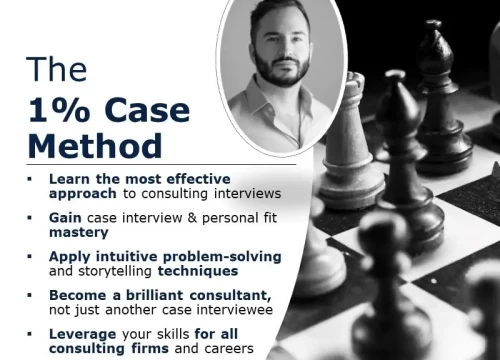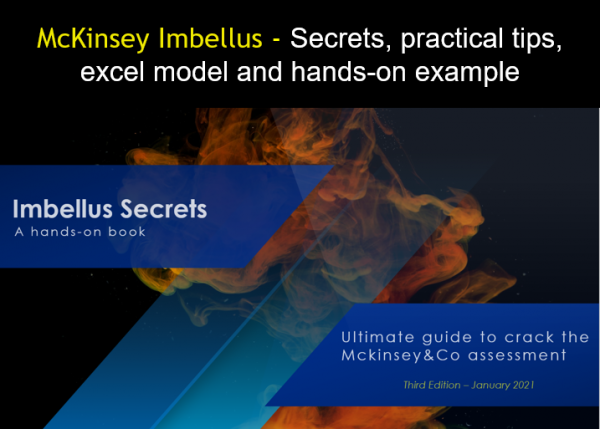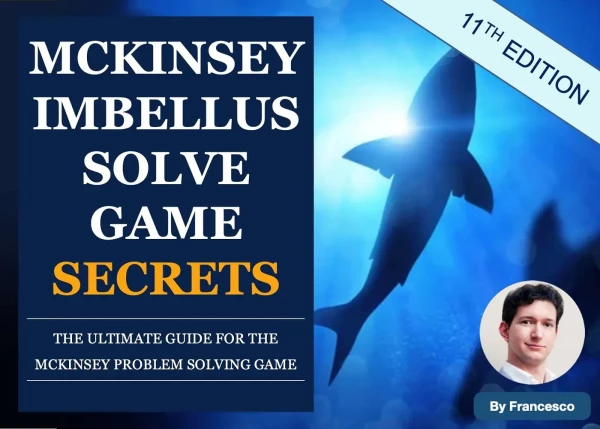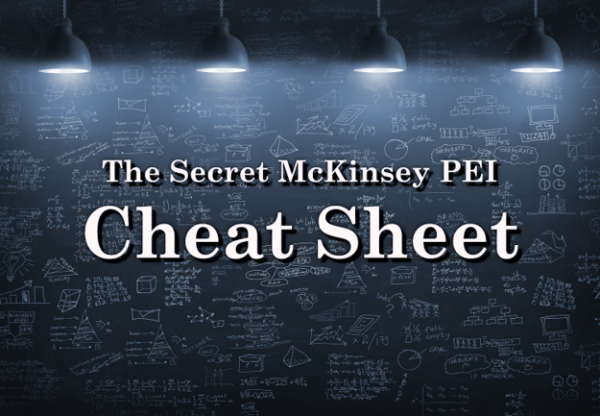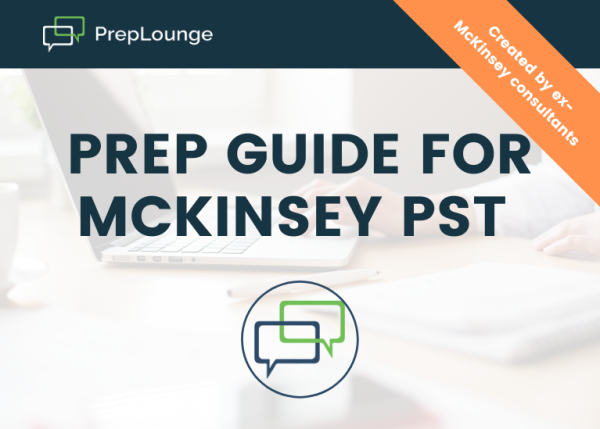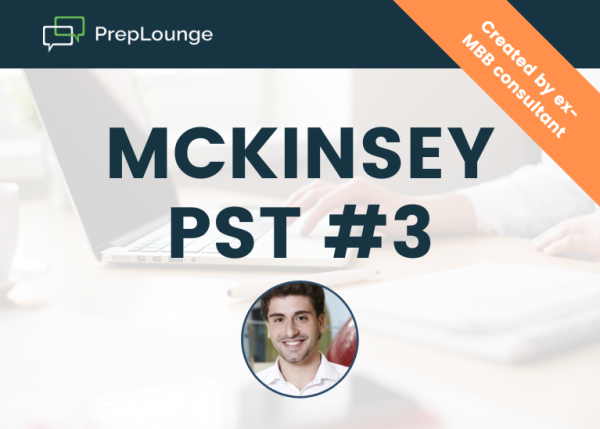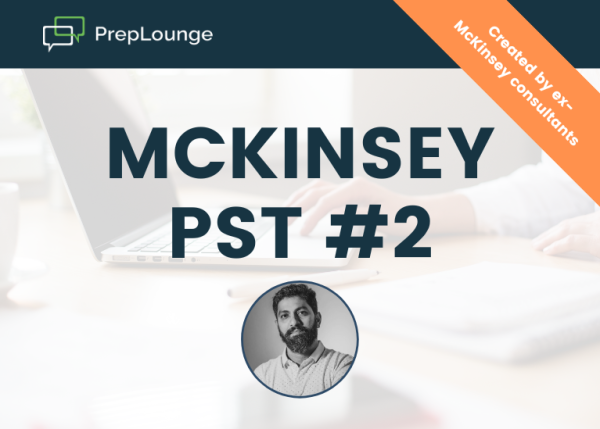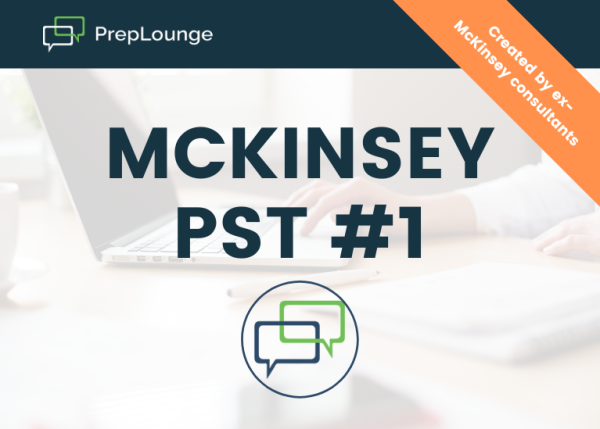Werde aktiv in unserer Community aus über 451.000 Gleichgesinnten!
Hi, I would like to ask you which casebook to use to train on cases that are similar to the ones asked at McKinsey. Thx
Übersicht der Antworten
Hey there,
Unfortunately, there are very few real McKinsey-style cases out there, the 'best' ones can be found on the McKinsey career website.
However, any case is a McKinsey case if you make it one. Let's dissect the differences and see how you can use the cases you already have for practice:
1. The difference between a McKinsey case and a non-McKinsey case first and foremost lies in the interviewer-led format as you are aware. Every case you have in this case book can be asked from an interviewer-led perspective.
In the McKinsey interview you will have to answer three different questions types - broadly speaking:
- Structuring
- Exhibit Interpretation
- Math
Use the cases from your books and focus on these three question types. While in candidate-led cases, they should arise naturally when you drill down into your structure, in McKinsey interviews, the interviewer will bring them up in succession.
In your case books, answer one question, then move to the next.
2. The second big difference lies in the nature of questions asked at McKinsey. At the core, McKinsey wants to see creative ideas communicated in a structured manner, the more exhaustive the better.
As a result, McKinsey cases will usually be very creative in nature and not something that can be solved by looking at industry frameworks or industry trends.
Be aware that frameworks were applicable in the 2000 years, the era of Victor Cheng and Case in Point. McK has long caught up on this and the cases you will get during the interviews are tailored in a way to test your creativity and ability to generate insights, not remember specific frameworks.
3. The third big difference is how to answer the questions in a McKinsey interview. Since the interviewer guides you from question to question, you need to be in the driver's seat for each question and treat each almost like a mini case in itself.
Your goal should be to come up with a tailored and creative answer that fits the question. The framework should - broadly speaking - follow these three characteristics:
- Broad
- Deep
- Insightful
The firm wants to see exhaustive and creative approaches to specific problems, which more often than not do not fit into the classic case interview frameworks (or can be derived from industry drivers and trends) that were en vogue 10 years ago...
Again, this only applies if everything you say
- adds value to the problem analysis
- is MECE
- is well qualified
- includes a detailed discussion of your hypotheses at the end
As a result, you can spend several minutes, guiding the interviewer through your structure!
Now for Structure and Exhibit Interpretation, there is also no right or wrong answer. Some answers are better than others because they are
- deep
- broad
- insightful
- hypothesis-driven
- follow a strong communication (MECE, top-down, signposted)
That being said, there is no 100% that you can reach or the one-and-only solution/ answer. It is important that your answers display the characteristics specified above and supported well with arguments.
As for Math questions, usually, there are answers which are correct (not always 100% the same since some candidates simplify or round differently - which is ok), and others that are wrong, either due to the
- calculation approach
- calculation itself
The difference in format and way of answering a question is the reason why I recommend preparing very differently for McK interviews vs. other consultancies.
Now that you know about
- the different format
- the different question types and case briefs
- the ways to answer the questions
you can start using the cases you already have and approach them in a McKinsey-specific way.
If you have any more questions, please feel free to reach out for some free guidance on how to come up with your own McKinsey-type cases on the spot.
Cheers,
Florian
(editiert)
Hi there,
Mckinsey-style Advanced Cases
- Columbia
- Cases by Firm
- Cases ranked by difficulty of Math, Structure, AND Creativity
- Stern
- Cases by interviewer vs interviewee-led
- Ranked by difficulty
- Haas
- Cases by interviewer vs interviewee-led
- Ranked by difficulty
- Darden
- Cases by Firm
- Cases ranked by difficulty across quantitative, qualitative, and overall
Now, remember, much more important than just reading a "hard" McKinsey case or having a friend case you in it, is actually how you're cased. I can make the easiest case be your worst nightmare (as can any other coach). Make sure that, if you're really trying to get pushed hard and get prepared for the toughest cases, you're looking at hiring a coach...delivery is truly key here!
I've not seen a specific casebooks but there are many McKinsey type cases on PrepLounge as well as the various MBA case books.



